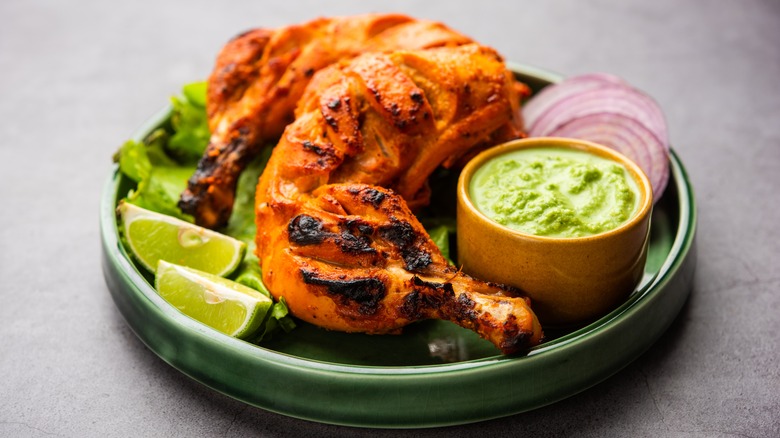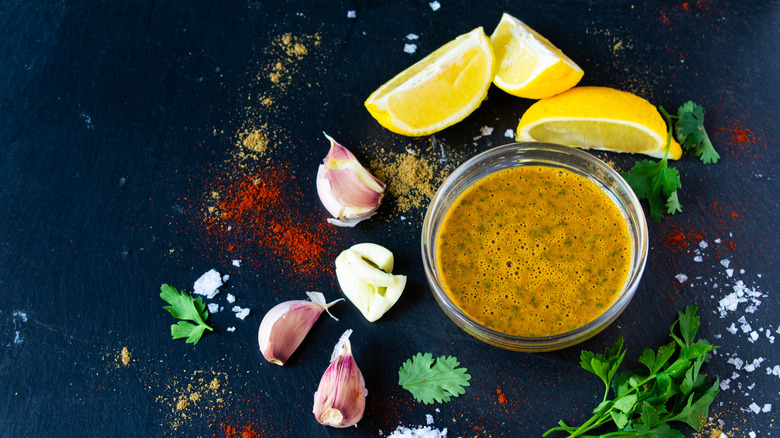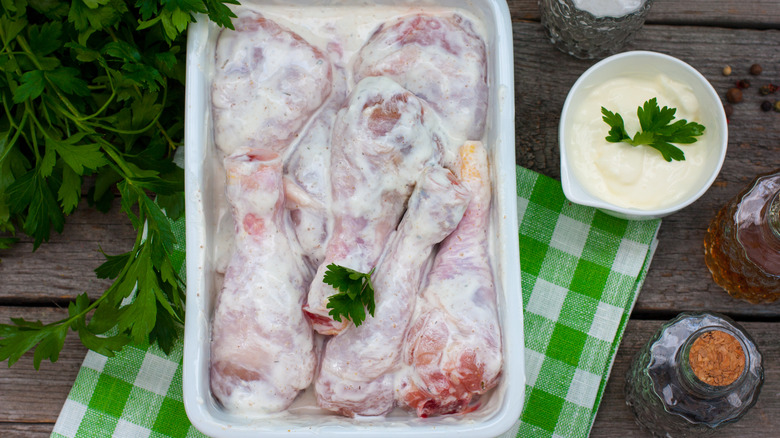The Scientific Reason Yogurt Meat Marinades Work So Well
Great meat is often thanks to a great marinade. It can be the difference between dry, bland meat and juicy muscle bursting with flavor. Marinades serve a dual purpose in cooking meat, contributing flavor, and tenderizing the muscle. However, in order for those effects to be fully realized, you have to give the marinade some time.
Many recipes call for you to marinate meat for a few hours, which can be a challenge if you're tight on time. A convenient option is to prepare a marinade ahead of time and pop it in the fridge overnight. By the time you've wrapped up work the next day, your meat is ready to go.
There's just one problem with this approach. A lot of marinades call for an acidic component. Oftentimes, it is some form of citrus juice, although some marinades go for more creative choices (even Dr. Pepper). The acid helps to tenderize the meat, but this can be taken too far. If the muscle is exposed to acid for too long, it can break down so much that it becomes mushy.
You might think this rules out any acidic marinade for overnight purposes, but not all acids are created equal. Yogurt is a vital base of many Middle Eastern and South Asian marinades, with tandoori chicken being a particularly well-known example. Yogurt contains a particular kind of acid that can tenderize meat without the risk of overdoing it, and it comes down to some very intriguing science.
How acid works in meat marinades
Let's talk about why marinades are so important in the first place. Meats have an unfortunate tendency to dry out when they cook because of water loss. In raw form, meat contains a great deal of water, most of which is trapped between muscle fibers. A very small amount of the moisture (roughly 5%) is actually bound to proteins within the muscle. When meat meets heat, its proteins denature, shrinking and releasing a lot of that intramuscular water, which leaves you with a tough, dry end product. Adding an acidic component to a marinade can help you avoid this issue.
Acids break down proteins, including collagen, which gives animal muscles their rigid structure. When the proteins denature, they change shape, exposing the water that's trapped between muscle filaments to new amino acids. The water can then bind to those amino acids, preventing it from escaping the meat during cooking.
In simple terms, exposure to acid increases the amount of water that meat can absorb. If you were to leave the meat in acid for too long, eventually all of the protein would break down, and you would be left with a mushy mess that's even less appealing than dry meat. That's why you need to get the marination time just right. The rate at which proteins denature depends on the type of acid in your marinade — and yogurt has the ideal type for long, overnight efforts.
Different acids have different effects on meat
Marinades typically deal with three types of acid — lactic acid, citric acid, and acetic acid — each of which tenderizes meat at a different rate. Lactic acid is naturally found in red blood cells and muscles, produced when the body breaks down glucose for energy. Because lactic acid is naturally synthesized by animal cells, our bodies (as well as the bodies of the animals we eat) are very good at regulating it.
Citric acid is also produced in the mitochondria of animal cells, so the body has experience handling it as well. However, there is far less citric acid in the body than lactic acid, so the body doesn't have quite as strong a mechanism for regulating it. Acetic acid, which is abundant in vinegar, is the only one that doesn't occur in animal cells, meaning the body has no way to manage its levels.
Yogurt, being made from milk, contains lactic acid, which animal cells handle very well. It will certainly tenderize the meat, but it works at a gradual pace and is unlikely to get out of hand. Marinades with vinegar work much faster because proteins aren't made to handle acetic acid and break down easily. Citric acid's effects fall somewhere in the middle. Compared to vinegar and citrus juice, yogurt needs extra time to work its tenderizing magic, but this is exactly what makes it so perfect for overnight marinades.


